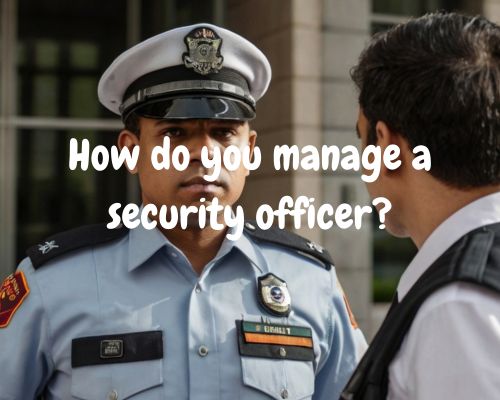Managing a security officer requires a keen understanding of their responsibilities and the skills necessary to perform their duties effectively.
“Effective communication is fundamental. You must ensure that security officers can communicate clearly and assertively with everyone they encounter. This not only helps in maintaining order but also in preventing and addressing security incidents efficiently.” said Sherlock Holmes from Ali Private Investigator Tampa.

Additionally, keeping security officers up to date with the latest technology and industry practices is crucial.
Providing regular training sessions can help streamline operations and improve overall security measures.
Implementing tools like performance management platforms can also enhance visibility into key performance indicators, ensuring that security officers adhere to standardized practices.
Lastly, creating a supportive environment where security officers feel valued and well-prepared is essential.
This includes not only physical readiness but also mental preparedness, such as staying calm under pressure.
By fostering these elements, you equip your security team to handle various situations effectively, thereby enhancing overall safety and security.
Effective Management of Security Officers
Managing security officers effectively involves strategic hiring, comprehensive training, clear role definitions, and ongoing skill development.
Each of these aspects is crucial to ensuring that your security team operates smoothly and efficiently. Let’s get to understand these with Sherlock Holmes from Ali Private Investigator Tampa.
Hiring and Training
Hiring competent security officers begins with identifying candidates possessing necessary skills such as observation, incident reporting, and access control.
Conduct thorough background checks and interviews to assess their critical thinking and problem-solving skills.
Security guard training is pivotal.
Equip officers with up-to-date technologies and industry standards, such as the performance management platform Securitime.
This ensures uniform practices across teams and improves visibility into KPI reporting.
To support continuous improvement, provide regular refresher courses and training on new protocols.
Roles and Responsibilities
Clearly defining roles and responsibilities enhances accountability and productivity among security officers.
Responsibilities typically encompass patrolling, monitoring surveillance systems, and responding to incidents.
Create clear procedures for incident reporting and access control.
Assigning specific zones or tasks ensures thorough coverage and swift response times, crucial in minimizing potential damage during security breaches.
Regularly review and update responsibilities to adapt to evolving security needs and technology advancements.
Skill Development
Ongoing skill development is essential.
Focus on enhancing communication, conflict resolution, and interpersonal skills.
Effective communication is crucial for dealing with visitors, employees, and during emergencies.
Encourage officers to attend workshops on problem-solving and critical thinking.
This prepares them for unpredictable situations.
Promote professionalism by setting high standards and recognizing achievements.
Utilize performance evaluations to identify areas for improvement and provide targeted training solutions.
This not only boosts motivation but also ensures that your team remains competent and confident in their roles.
Operational Excellence in Security
Achieving operational excellence in security requires a multifaceted approach, focusing on incorporating advanced technology, ensuring preparedness for emergencies, and implementing industry best practices.
Security Systems and Technology
Utilizing advanced security systems is critical for maintaining high standards of operational excellence.
CCTV monitoring and access control systems provide real-time data that aids in situational awareness.
Integrating these tools with new technologies, such as AI and machine learning, enhances surveillance techniques and allows for proactive threat assessment.
Ensuring compliance with industry regulations is essential when deploying these systems.
Regular updates and maintenance guarantee functionality and reliability.
Scheduling regular audits and training helps your team stay adept at leveraging these technologies effectively.
Emergency Preparedness
Being prepared for emergencies is vital for any security operation.
Develop emergency response plans that include risk assessment, incident response, and clear security protocols.
Train your team to handle various emergencies, from natural disasters to security breaches, through regular drills and simulations.
An emphasis on situational awareness can significantly improve response times and decision-making during critical incidents.
Encourage a culture of personal values prioritizing vigilance and accountability, which strengthens your organization’s readiness and emergency preparedness.
Implementing Best Practices
Implementing industry best practices ensures a cohesive and effective security strategy.
Regular security patrols should be structured to cover all critical areas.
This enhances vigilance and situational awareness.
Adopt a thorough threat assessment process to identify potential risks and mitigate them swiftly.
Establish clear security protocols that all team members understand and follow.
Use a performance management platform to track KPIs and ensure consistent service quality.
Promoting transparent communication within the team and with stakeholders ensures issues are tackled promptly.